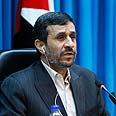
New sanctions coming? Ahmadinejad
צילום: AP
Iran faces steep gasoline troubles
Head of National Distribution Oil Products Company says consumption remained unchanged despite 20 percent cut in fuel rations. 'To meet the shortage, we need to 5.8 million gallons of gasoline and 2.38 million gallons of gas oil per day,' he says
A senior Iranian oil official said Sunday that stiffer gasoline rationing imposed late last year has failed to reduce domestic demand, an acknowledgment that reflects the OPEC nation's economic struggles as it faces possible new sanctions.
Farid Ameri, the head of Iran's National Distribution Oil Products Company, said gasoline consumption had remained unchanged this year despite a 20 percent cut in fuel rations since December.
"To meet the shortage, we need to import 22 million liters per day (5.8 million gallons) of gasoline and nine million liters (2.38 million gallons) of gas oil per day," Ameri was quoted as saying on Shana, the Oil Ministry's Web site.
The remarks highlight the challenges confronting President Mahmoud Ahmadinejad's hardline government as it struggles to rein in soaring fuel costs while also grappling with the possibility of new sanctions that could further hammer the country's faltering economy.
Since December, Iranian drivers have had an 80 liter (21.13 gallon) allotment of gasoline per month at a subsidized price of 1,000 rials - or about 10 cents per liter. Any volume over that costs roughly four-times the subsided price. Previously, each car received 100 liters per month.
Iran is home to the world's second largest proven reserves of conventional crude and produces about 4.2 million barrels of oil per day. But a lack of refining capacity means that it produces roughly 44 million liters (11.63 million gallons) of gasoline per day _ around only two-thirds of its of daily demand. Tehran must import more than 5 million gallons to meet its daily needs.
The imports, coupled with the subsidy program, are a heavy drain on the state budget, which relies on oil sales for around 80 percent of its revenues.
Growing oil links between China, Iran
Iran's parliament has approved a bill submitted by Ahmadinejad aimed at phasing out the subsidies and distributing the money directly to the neediest Iranians, a populist measure which some analysts say will only serve to sharply boost inflation that some analysts say is already hovering around 20 percent. Official reports put the inflation at about 12 percent.
US sanctions - in place for years because of what Washington says is Iran's support for terrorism - have limited foreign investments in the country. Their most pronounced impact, however, has been to keep US oil companies out of the country and discourage other Western firms from investing as well, hampering Iran's access to funds and technology it sorely needs to upgrade its dilapidated oil sector.
Iran says it needs some $200 billion over the next five years to revamp the sector and boost production.
Western powers are pushing for a fresh round of sanctions against Iran in response to Tehran's defiance over its nuclear program. The threat makes it even less likely that Western firms will invest in the country, and Tehran has been courting Chinese and Russian companies instead.
The two nations - both veto-wielding members of the United Nations Security Council - have been the most resistant to calls for additional sanctions. Analysts say they are also wary of investing too heavily in Iran at present.
Iran insists its nuclear program is for peaceful purposes, while the US and its allies maintain it aims to develop nuclear weapons.
US lawmakers are also looking to slap new sanctions on Iran aimed at penalizing companies that sell fuel to the Islamic republic. The move, which was approved last year by the House of Representatives, could seriously hamper Tehran's ability to secure sorely-needed fuel imports.
Iran has been stepping up efforts to boost its domestic refining capacity.
On Saturday, the semiofficial Mehr news agency reported that Tehran had selected partners for five new refineries under construction. The report, which carried no attribution, said Malaysia's Petrofield would get a 40 percent stake in the Pars Petrofield refinery while an Indonesian company would get a 15 percent stake in the Persian Gulf Star, or Setareh, refinery.
A day earlier, the head of Iran's state-owned North Drilling Company, Hedayatollah Khademi, told Shana that the country had signed a $143 million contract to buy an oil rig from China and that Iran would likely purchase two more rigs.
China imports about 700,000 barrels per day of crude from Iran, and Chinese companies have partnered with Tehran to develop the 17 billion barrel Yadavaran oil field. In other indications of growing oil links between the two countries, Iran replaced French energy giant Total with China's CNPC to develop one of the phases of the massive South Pars gas field.










